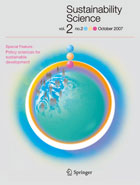 The journal Sustainability Science offers insights into interactions within and between nature and the rest of human society, and the complex mechanisms that sustain both. The journal will promote science based predictions and impact assessments of global change, and seek ways to ensure that such knowledge can be understood by society and be used to strengthen the resilience of global natural systems (such as ecosystems, ocean and atmospheric systems, nutrient cycles), social systems (economies, governments, industry) and human systems at the individual level (lifestyles, health, security, and human values).
The journal Sustainability Science offers insights into interactions within and between nature and the rest of human society, and the complex mechanisms that sustain both. The journal will promote science based predictions and impact assessments of global change, and seek ways to ensure that such knowledge can be understood by society and be used to strengthen the resilience of global natural systems (such as ecosystems, ocean and atmospheric systems, nutrient cycles), social systems (economies, governments, industry) and human systems at the individual level (lifestyles, health, security, and human values).
Sustainability Science journal provides a trans-disciplinary platform for contributing to building sustainability science as a new academic discipline focusing on topics not addressed by conventional disciplines. As a problem driven discipline, sustainability science is concerned with addressing practical challenges caused by climate change, habitat and biodiversity loss, and poverty among them. At the same time it tries to investigate root causes of problems by uncovering new knowledge or combining current knowledge from more than one discipline in a holistic way to enhance understanding of sustainability. This includes setting clear benchmarks and indicators, dealing with uncertainty, facilitating co evolution of knowledge, and recognizing trade-offs between global and local problems. The journal especially encourages research on the needs of developing countries for poverty reduction, education, sustainable development and human and environmental security (open access is available to Sustainability Science through the Developing Country Initiative, including Online Access to Research on Environment (OARE)). Such new knowledge can directly inform policy and management decisions.
Ultimately the journal sees the use of such research, in collaboration with industry, governments, and the public as a basis for helping to build a resource circulating society, alleviating population, food, water, climate change pressures, and transforming the socioeconomic structure of contemporary society into a sustainable one. With this in mind, the journal provides a multidisciplinary forum for communication among researchers, policy makers, practitioners, educators, and the young generation.
